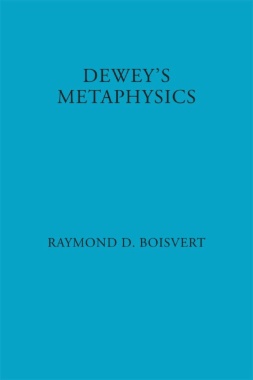This work challenges recent neo-pragmatist interpretations of Dewey as a historicist, radically anti-essential thinker. By tracing Dewey's views on the issues of change and permanence, Boisvert demonstrates the way Dewey was able to learn from important scientific discoveries.
- Cover
- DEWEY'S METAPHYSICS
- Title
- Copyright
- Dedication
- ACKNOWLEDGMENTS
- CONTENTS
- Abbreviations
- Introduction
- 1. Preliminary Remarks
- 2. The Need for Such a Study
- 3. General Outline
- I • IDEALISM
- 1. Change and Permanence in Dewey's Idealistic Period
- 1. Introduction
- 2. Dewey's Idealistic Years
- 2.1. Dewey's Kantian Phase
- 2.11. Knowledge as Mediated and Synthetic
- 2.12. The Transition to Hegelianism
- 2.2. Dewey’s Hegelian Phase
- 2.21. The Influence of Trendelenburg
- 2.22. The Influence of George Sylvester Morris
- 2.23. Dewey's Writings During His Hegelian Phase
- 2.24. Dewey on Leibniz
- 2.241. Relations
- 2.242. Intelligence
- 2.243. The Dynamic Interpretation of Existence
- 2.244. Potentiality, Actuality, and End
- 3. Summary
- II • EXPERIMENTALISM
- 2. Darwin, Change, and the Transition to Experimentalism
- 1. A Renewed Emphasis on Change
- 2. Darwin's Impact on the Conception of Form
- 2.1. Implications of the New View for Traditional Philosophical Problems
- 2.2. Specific Implications of the New View for the Question of Change and Permanence
- 3. Dewey: Still a Kantian?
- 4. Summary
- 3. Change and Permanence in the Experimental Logic
- 1. Introduction
- 2. Restatement of the Problem
- 3. Dewey's Criticisms of Alternative Views
- 3.1. "Objects" in Dewey's Instrumentalism
- 3.2. Dewey and Realism
- 3.3. Dewey and Idealism
- 4. Dewey's Constructive Doctrine
- 4.1. Thought and Things
- 4.2. Eidos
- 5. Summary
- III • NATURALISM
- 4. Dewey's Objections to Traditional Doctrines
- 1. Introduction
- 2. Techne and Physis
- 3. Change, Permanence, and the Need for Philosophy
- 3.1. Permanence and Social Need
- 3.2. Art and Forms
- 3.3. Biology and Language
- 3.4. Selective Emphasis
- 4. Dewey and Kant Re-examined
- 4.1. Takens or Givens?
- 4.2. Reason and Intelligence
- 5. Summary
- 5. Metaphysics and Evolutionary Biology
- 1. Continuity with the Classical Tradition
- 2. Evolution and Ontology
- 2.1. Interaction and the Separation of Matter and Form
- 2.2. Three Characterizations of Forms
- 2.3. The Dynamic Interpretation of Beings
- 3. Categorial Analysis
- 3.1. Events
- 3.2. Relations
- 3.3. Categories Apply to Both Techne and Physis
- 4. Objective Relativism and Forms
- 4.1. Forms as Objectively Relative in Techne and Physis
- 5. Summary
- 6. Dewey's Reconstruction of Traditional Metaphysics
- 1. Introduction
- 2. Forms and Ends
- 3. From Techne to Physis in Dewey
- 4. Dewey's Reformulation of Classical Insights
- 4.1. Forms as "Eternal"
- 4.2. Intelligence and Forms
- 4.3. Forms as Possibilities
- 4.4. A Pluralistic Theory of Forms
- 5. Summary
- 7. Logical Forms
- 1. Introduction
- 2. Logic as Methodology
- 3. Logic and Ontology
- 4. Logical Forms
- 5. Summary
- Conclusion: Some Implications of the Study
- 1. Dewey and the Foundationalist/Anti-Foundationalist Controversy
- 2. On Interpreting Dewey
- Bibliography
- Indices

